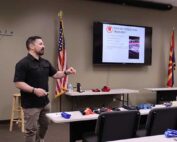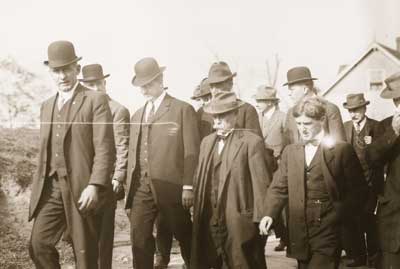
corrections
Mixing Volunteers And Cons.
An ethnically mixed group of professionals files through the prison gates early one Saturday morning. The guards check their ID’s, run them through the metal detector, search through their belongings and issue them badges so they can spend time in the prison. Occasionally, one of them is pat searched or the drug dog gives them a sniff. Most have barely enough time to finish chores at home and tend to their families before getting back to their regular jobs; but they schedule enough time to spend anywhere from an hour to most of a weekend behind bars providing services to inmates — for no tangible compensation.
The prison staff often look at them suspiciously and ask, “Why do you come here?” The prisoners are grateful for their visits, but they too voice the same question. The program employees are the most welcoming because the volunteers make their jobs more manageable.
A Strange Mix?
Volunteers offer prisons a cost-effective way to enhance inmate programs. With group and individualized training, civilian volunteers can supplement educational, vocational, employment, recreational, substance abuse and family, economic and faith-based programs. Most volunteers come from local organizations. Prisons provide training for volunteers to assist them in complying with prison rules and to help them spot a scam … hopefully from a mile away. Of all the volunteers coming into prisons, the religious services, substance abuse programs and recreational programs benefit the most inmates, by far.
Out on the softball field, a team of volunteers from the local community league is warming up in preparation of a game against the inmates. They’ll play under some unusual circumstances, but when it’s over, win or lose, the community team will have bragging rights when they return to their regular league play. That truly seems to be this group’s only motivation, but there’s never a lack of teams lining up to come inside and play.
In the program services section, volunteers in the substance abuse programs participate to assist with inmate recovery issues. The volunteers have previously sought help, and are returning the favor in the form of sponsorship and group support.
Religious services volunteers have their work cut out for them. Many believe prisoners who “find God” inside the prison are using religion to manipulate the system. But, as one volunteer told me, “If their objective is to impress the parole board and a poor intention is all it takes to begin to bring them God’s message, then that’s okay. The hope is these convicts will hear something to change their heart, mind and purpose.” A shot in the dark by the volunteer group, maybe, but they seem to be willing to take the chance with the prisoners.
Many volunteers are apprehensive at first because what little they know about prisons usually comes from TV, they soon realize TV prison isn’t very realistic. Most are recruited by members of their church congregation or their weekly NA or AA groups. These volunteers minister to prisoners following a program promoting sobriety, pro-social behaviors and building pro-social characteristics. They want these guys to know they’re not alone and the community will continue to assist them and their families as they return to community life.
Saved Lives
Volunteers frequently report they’re surprised to learn many prisoners believe prison saved their lives. The prisoners’ express being on a track to destruction, and eventual death in the life they were leading before incarceration. Prison volunteers give them a light to follow and teach them skills and provide a support system to help them take control of their lives. But they also learn the road to recovery and redemption can be rocky and even dangerous for some. Learning about the culture and evolution of the individuals they are helping is an essential element of successful intervention for volunteers.
Volunteering in prisons is fraught with challenges and frustrations. More astute volunteers realize the prison staff must always be aware of volunteer’s activities, may change things without notice and may also require additional training and a change of volunteer group composition periodically.
This can be frustrating for volunteers who do not understand the dynamics of prison populations and the danger to prison security of becoming routine and predictable. A strong and available prison administrative collaboration with the volunteers helps to mitigate those problems successfully.
Volunteers claim their desire to help originates from a spiritual calling, or a wish to repay a debt of assistance provided to them. They find fulfillment by being part of rehabilitative efforts and seeing glimpses of what is possible in the lives of those who previously allowed negative influences to control their lives. This fulfillment is reportedly the main reason they return each time and a darn good answer to the question.
If you’re a correctional officer, keep an open mind to these groups. While it may seem a waste of time to you for them to try, their track record is such that it’s worth the effort to help them out.
By D.M. Chamberlain
Read More Corrections Articles
View The American COP April 2014 Issue Now!















